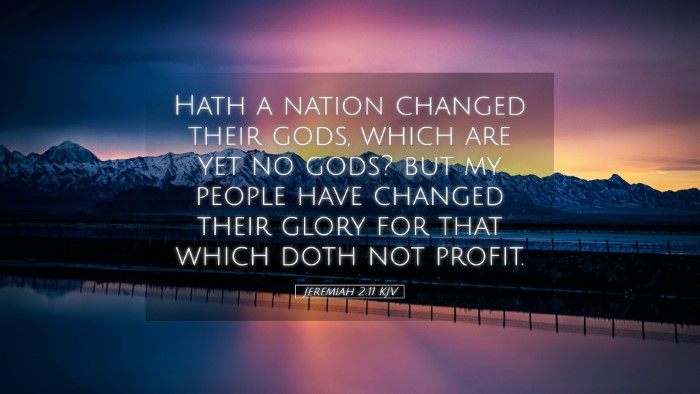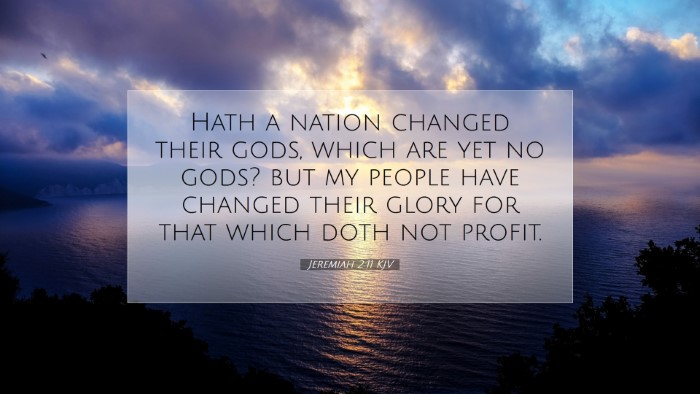Commentary on Jeremiah 2:11
Verse: "Hath a nation changed their gods, which are yet no gods? but my people have changed their glory for that which doth not profit."
Introduction
The book of Jeremiah presents a prophetic lamentation over the people of Judah, who have deeply strayed from the worship of the true God. In chapter 2, Jeremiah confronts the people with their infidelity and ungratefulness. Verse 11 starkly contrasts the behavior of other nations with the actions of God's chosen people, emphasizing a profound spiritual betrayal.
Contextual Background
This verse is part of a broader discourse where God sends Jeremiah to proclaim the spiritual adultery of Judah. The people, who had once known the true God and experienced His deliverance, now turned to worthless idols. The essential nature of God's relationship with His people is one of covenant fidelity, and Jeremiah's message serves as a call to repentance.
Exegesis of the Text
Verse 11 poses an emphatic rhetorical question: "Hath a nation changed their gods, which are yet no gods?"
- Contrast with Gentiles: This line illustrates the absurdity of Israel's infidelity. While Gentile nations would remain loyal to their deities, even if they are false, Judah has forsaken their God, who is the only true God.
- Changed Their Glory: The phrase "changed their glory" signifies a loss of honor and identity. God's glory embodies His presence and the privileges bestowed upon His people. The act of exchanging this glory for pagan idols reflects a grievous error in judgment and a willingness to embrace futility.
Theological Insights
This verse serves as a profound reminder of the nature of idolatry. The people of Judah believed that the gods of neighboring nations could provide them more than Yahweh could. However, this stems from a fundamental misunderstanding of God's character.
- Idolatry as a Profound Loss: Idolatry is depicted not merely as a mistaken devotion but as an ultimate tragedy where the worshipper exchanges what is eternal and glorious for that which is inherently worthless.
- God's Covenantal Faithfulness: This verse underscores the faithfulness of God juxtaposed against human unfaithfulness. Jeremiah's lament is a call to remember God's past deeds and the relationship that was formed with the nation of Israel.
Insights from Matthew Henry
Matthew Henry emphasizes the unparalleled nature of Israel's sin. In his commentary, he points out how no other nation would abandon their gods so readily for something that cannot benefit them:
- Absurdity of Idolatry: Henry highlights that even the most deluded Gentiles maintain some loyalty to their false gods, which intensifies the treachery of Israel's actions.
- Spiritual Complacency: He notes the danger of the complacent heart, one that does not see the magnitude of its failure and hence continues in sin rather than seeking restoration.
Insights from Albert Barnes
Albert Barnes provides a detailed analysis concerning the consequences the Israelites faced due to their choice to abandon God:
- Consequences of Apostasy: Barnes stresses that Israel’s abandonment of God led to a chain of consequences, including a loss of divine protection and eventual conquest by their enemies.
- Understanding 'No Gods': He elaborates that the phrase "which are yet no gods" signifies the futility and emptiness of indulging in idolatry, instructing readers on the importance of discerning what is true and beneficial.
Insights from Adam Clarke
Adam Clarke focuses on the moral implications of the verse. He posits that:
- Call for Reflection: Clarke encourages believers to reflect on their own lives and the things they may be placing above God, underscoring that modern society, perhaps even more than ancient Israel, exchanges true worship for empty pursuits.
- Restoration: The commentary highlights the hope found in repentance, indicating that God is always ready to restore those who return to Him, no matter the depth of their betrayal.
Practical Applications
For pastors, students, and theologians, Jeremiah 2:11 offers rich ground for both theological exploration and practical applications:
- Evaluating Our Worship: This verse prompts a self-examination of the objects of our devotion. What modern "gods" might we have adopted that lead us away from the true worship of God?
- Teaching on Idolatry: Pastoral teachings can incorporate discussions on the dangers of idolatry, ensuring that congregants understand the significance of loyalty to God above all else.
- Call to Repentance: Just as Jeremiah called for repentance and renewal, contemporary teaching can instill a sense of urgency to turn back to God, stressing His readiness to forgive and restore.
Conclusion
Jeremiah 2:11 serves as a piercing reminder of the gravity of faithlessness and the heart of idolatry. By drawing on the insights of esteemed biblical commentators like Matthew Henry, Albert Barnes, and Adam Clarke, we are reminded of the consequences of turning away from God and the hope found in repentance. The call to fidelity to God not only resonates through the ages but remains pertinent in the modern church, urging all believers to faithfully cling to their Creator and Redeemer.


